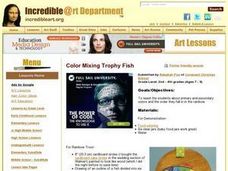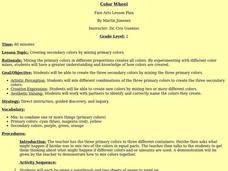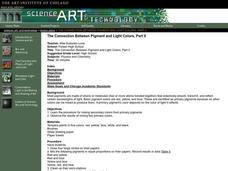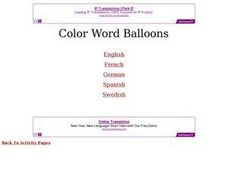Curated OER
Painting a Neighborhood
Students explore the concept of neighborhoods and identify primary and secondary colors. In this colors and community lesson, students read the book Harold and the Purple Crayon and then discuss the concept of a neighborhood. Students...
Curated OER
Tissue Paper Flowers
Here is a sweet and simple instructional activity that introduces young learners to the three primary colors; red, yellow, and blue. Through a discovery process, youngsters learn how to successfully identify these colors, and the many...
K-5 Math Teaching Resources
Mini Math Word Wall
Provide a little extra support for your emerging mathematicians with a personal word wall. Including graphics and images that support children with learning to count, identify colors and shapes, and read high frequency words, this
Curated OER
The Color Wheel
Hand out this nifty resource to make your next lesson on the color wheel a snap. It is a picture of the color wheel alongside a description of primary, secondary, and mixing colors. Great for artists of any age.
Curated OER
Color Theory
Sixth graders explore the basics of color mixing with paint by creating secondary and tertiary colors. Individually, 6th graders create their own paintings based on a popular series of sculptures.
Curated OER
The Art and Science of Impressionist Color
Discover Impressionist painting as students investigate the 19th century combinations of colors characteristically used. Students experiment with their own paintings, utilizing primary and secondary colors.
Art Institute of Chicago
Color Combinations
Explore color through an examination of pointillism and light. Class members view Georges Seraut's famous painting on a computer, zooming in and out to see the details and effects of the technique. They then cover how light and color are...
Curated OER
Chromatography Lab
Students discover the components of primary and secondary colors. For this physical science lesson, students create a set up in which water will separate a color into the component colors along a piece of filter paper. Students will then...
North Birmingham Academy
Color Theory
What better way to learn about colors than by coloring? Starting with the primary colors, young artists follow written prompts to shade in various rectangles and a color wheel to show complementary colors, tints and shades, and more.
Curated OER
Mixing Colors with "Little Blue and Little Yellow"
Students mix colors to make new colors. In this color mixing lesson, students listen to Leo Lionni's Petit Bleu et Petit Jaune, before retelling the beginning, middle, and end of the story. They watch as the teacher mixes food coloring...
Curated OER
Color Mixing Trophy Fish
Students compare colors. In this color lesson, students determine which colors are primary and which are secondary. Students investigate rainbows and create a piece of art organizing colors as they appear in a rainbow.
Curated OER
Color Questions
In this colors worksheet, students read through a chart that explains which primary colors can be mixed together to form secondary colors. They then answer 3 questions about mixing colors. Finally, students answer 4 additional questions...
Curated OER
Rain Orchestra
First graders mix secondary colors from primary colors and simulate a rainstorm by using body percussion.
Curated OER
Help Wanted: A Lighting Engineer For Popular Rock Group
Young scholars are assigned to groups, and determine each member's role in the group. They will design an experiment to determine a way to produce the three primary and five secondary colors. Students discuss color and mood. They listen...
Curated OER
Elements of Art: Student Assessment
What a neat test! The class is asked to draw and color to create examples of eight elements of art. They focus on each element (line, value, shape, form, space, texture, primary and secondary color) by creating an original piece in each...
Curated OER
Color Wheel
Second graders mix different combinations of the three primary colors to create the three secondary colors, then create new colors by mixing two or more different colors. They identify the colors they create.
Curated OER
The Connection Between Pigment and Light Colors
Students learn the procedure for mixing secondary colors from primary pigments and observe the results of mixing two primary colors.
Curated OER
The Purple Cow
Students read and discuss the poem, The Purple Cow. In this poetry instructional activity, students discuss the rhyming words in the poem and why this piece of literature is silly or unusual.
Curated OER
Vertical and Horizontal Lines
First graders view works from Mondrian such as "Composition with Red, Yellow and Blue" receiving explantion of the primary and secondary colors and the color wheel and vertical and horizontal lines. They glue black strips to the...
K12 Reader
Color Shows Mood
Colors, primary colors, secondary colors, neutral colors, mixing colors, the color wheel. As a reading comprehension exercise, kids read a short passage about colors and then answer a series of questions based on the article.
Urbana School District
Light
You matter, unless you multiply yourself by the speed of light ... then you energy. Presentation covers the behavior of light as both a wave and a particle, light versus sound, space travel, why objects have colors, depth perception,...
Curated OER
Color Wheel Project
Students review the relationship between primary and secondary colors. As a class, they are introduced to the tertiary colors and use photographs to show them in a room design. To end the lesson, they create a new color wheel with...
Curated OER
What You See Is What You Get
Pupils explore light and colors. They see how white light is made up of various colors. They need to have some background knowledge about prisms, light wave lengths, and behavior of light, primary and secondary colors, and ratios.
Curated OER
Color Word Balloons
In this color word balloons worksheet, students color six hot air balloons the color that is written underneath each balloon. Students utilize the colors of yellow, green, blue, orange, red and violet.

























